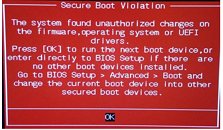Thursday, May 5th 2016

Microsoft Botches Up UEFI Support for Windows 7 on ASUS Motherboards
Microsoft inadvertently bricked a vast number of PCs running Windows 7, by changing the priority of an erroneous software update. Earlier this month, Microsoft changed the priority of an obscure-sounding security update for Windows 7 from "Optional" to "Recommended," (which by default gets automatically downloaded and installed). This update, KB3133977, bricks machines running ASUS motherboards, in the UEFI mode.
Windows 7 inherently does not support Secure Boot, a feature introduced with Windows 8, which takes advantage of UEFI to provide users with a layer of system integrity throughout the boot process. With KB3133977 installed on Windows 7 machines that use UEFI boot, the motherboard senses a Secure Boot violation, and invalidates the boot device (refuses to boot from it). ASUS recommended a BIOS setting with which you can deactivate Secure Boot while making your motherboard continuing to boot in UEFI mode.
Sources:
InfoWorld, Forbes
Windows 7 inherently does not support Secure Boot, a feature introduced with Windows 8, which takes advantage of UEFI to provide users with a layer of system integrity throughout the boot process. With KB3133977 installed on Windows 7 machines that use UEFI boot, the motherboard senses a Secure Boot violation, and invalidates the boot device (refuses to boot from it). ASUS recommended a BIOS setting with which you can deactivate Secure Boot while making your motherboard continuing to boot in UEFI mode.

46 Comments on Microsoft Botches Up UEFI Support for Windows 7 on ASUS Motherboards
At least the word Brick(ed) isn't in the title :), but maybe some of these custom 3rd party company's block you from changing any thing like this.
Your "belief" doesn't change reality.
IMO win7 is more secure than win 10, just look at all the privacy settings and what gets sent to MS that they dont really need to have to begin with. Security includes Privacy protection and Win 7 does a better job by not having all the same "doors" as Win 10 does
[EDIT] Excuse my French (bad English).
Now this discussion got me wondering even more if what I've got going on really could be related to W10 after all. I've already concluded it's a W10 thing. And it'd be pretty hard to convince me otherwise. This discussion just confirms it as far as I care. BTW my mobo is dual BIOS. And neither BIOS behaves any differently. I've flashed them both with BIOSs found on MSI's site. No change. Trust me, I've done every god damn thing that can be done besides uninstalling W10 and trying another OS. Which I'm not going to bother with. Because it works well enough for the moment. One more thing that just got brought to my attention though is Click BIOS II no longer works. It won't run at all now. I haven't messed with it in the last ~6 months. But a few days ago I tried it to see where I was at. And now it's totally broke too. Which probably is a good thing. Less temptation to fiddle with my BIOS. Which is likely to end in disaster no matter what I do.
Whatever it is, it ain't good. And I've been staying the hell away from my BIOS for the time being. Until I get a new mobo that is.
Plus bitlocker is better on Win10.
That is why the major Linux distros are starting to support it too. Ubuntu, for example, has supported secure boot since I believe 12.04.
As far as gaming, I think I'll build a W10 rig just for that and either keep my Win7 just for every day use or switch to Linux Mint.